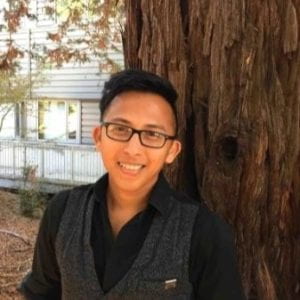Jed Pizarro-Guevara receives NSF Postdoctoral Fellowship

Jed Pizarro-Guevara
Jed Pizarro-Guevara, who received his PhD from UCSC in 2020, has been awarded a Postdoctoral Fellowship from the National Science Foundation. During the two-year fellowship, he will continue as a member of Professor Brian Dillon’s psycholinguistics lab at the University of Massachusetts, Amherst. Jed’s dissertation, When human universal meets language specific, was advised by Professor Matt Wagers. His work focuses on sentence processing in a variety of languages, most significantly Tagalog. Check out a description of the project, as well as related project he’s working on, below:
My current project (NSF SPRF #2204112) looks at reflexive processing in Tagalog: when Tagalog comprehenders interpret reflexives in real-time, to what extent do they attend to potential antecedents that are not licensed by the grammar? What types of linguistic information do they leverage to guide their interpretation? I’ll be using the visual world paradigm to investigate these questions. I’m currently running large-scale interpretation studies that look at the binding possibilities of reflexive pronouns in the language. These interpretation studies will form the empirical backbone of the visual world studies that I’ll be deploying at the University of the Philippines Diliman later this year (probably around August/September) and the year after (most likely around the same time). I haven’t been back since summer 2019, so I’m super excited about this research trip. I also get to take a grad student RA with me to assist with data collection. That should be fun! I can’t wait to introduce them to the wonderful people (and food!!) over there! 😄
Sort of related to this project is a collaboration I have with Özge Bakay. We’re conceptually replicating Dillon et al. 2013, which used eye-tracking while reading to compare interference effects in English subject-verb and anaphoric dependencies. This is particularly exciting for me because first, I get to work with undergrads again! They’re helping us make the visual world counterpart of the Dillon et al study. Second, we’ll be collecting data using an in-lab eye-tracker and a more portable eye-tracker, like the one that Matt and Maziar have used in z/lab [sentence processing work on Zapotec]! There’s obvious differences between the two (e.g., price, sampling rate, etc.), so we wanted to do an explicit comparison to see how qualitatively similar/comparable the data will be. We will begin data collection this Spring semester (or at least that’s the goal), so stay tuned!
Congrats, Jed!